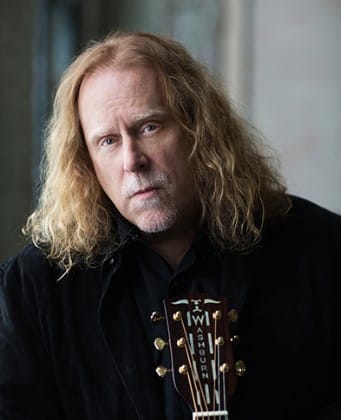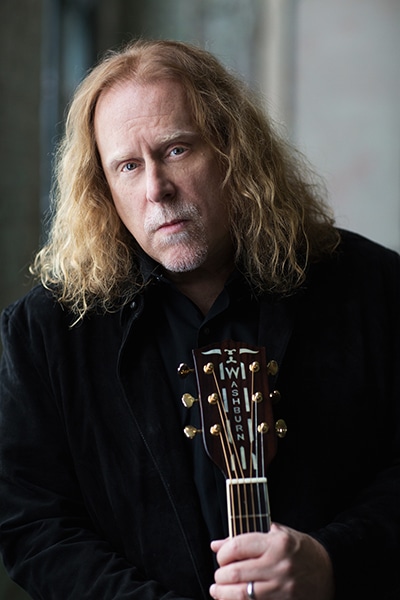Most musicians are lucky if they can be a part of one band that makes it big. Music legend Warren Haynes has been an integral part of three. From his time with the Allman Brothers, The Grateful Dead, and Gov’t Mule, Warren has seen the industry and the world go through some incredible changes. In advance of the Gov’t Mule concert coming to the Macon City Auditorium on April 26th, Warren took some time to talk to us about The Brotherhood, the term “Southern Rock” and mentoring the new generation of guitar legends.
CD – You have been a member of three of the most iconic bands in music history– so trying to figure out where I wanted to start this interview with you was a bit of a task. I guess I’ll start here: Talk to me about your very first guitar. What kind was it and who gave it to you?
WH – My first guitar was a Norma. It was $49 at the local hardware store. My dad got it for me when I was 12-years-old.
Ok. Now to piggyback off of that, what is your favorite guitar to play right now that you own?
A 1959 Les Paul that I’m proud to be the owner of. It’s my favorite. I don’t take it out on the road. It just has this unique, beautiful sound. I also have a 1961 Gibson ES 335 that I don’t carry on the road as well, but they both sound great in the studio or if I’m playing close to home.
That makes a lot of sense. The city of Macon and the rest of the world are celebrating the 50th anniversary of The Allman Brothers Band this year and the tremendous impact that it had upon the industry as we know it. In your opinion, being a member of this band for as many years as you have, what do the Brotherhood and Sisterhood mean to you?
You know, growing up in the South– I grew up in Asheville, North Carolina– I heard that music when I was nine-years-old. My oldest brother had the first Allman Brothers record when it first came out, and I fell in love with that music right off the bat– before I even started playing guitar. By the time I turned eleven, the Fillmore East album had come out and I was starting to mess around with my older brother’s acoustic guitar. So over the next few years, everybody that I knew listened to that music so much and being someone going up in the South, it kind of represented us. Here was this integrated band coming out of originally Florida and officially Macon, Georgia and making history by combining these genres of music together that had never been mixed together in quite that way. It was very personal and upfront for all of us in the beginning. But then I know obviously the rest of the country caught on as well.
We had longtime ABB manager Willie Perkins in the studio with us earlier this week, and during the interview, he hinted at the fact that he really did not like the term “Southern Rock”. And it kind of struck me because I’ve heard a lot of artists and musicians from that era say the same thing. Do you feel the same way about that phrase “Southern Rock”? And if so, why?
Well, I know that most of the original members of the Allman Brothers didn’t like that term. Gregg talked quite often about it and he even thought it was a bit redundant seeing as how rock music came from the South in the first place. I think the thing that most of us didn’t like about that term was any of the negative connotations that would be associated with it. Whether it was a rebel flag or racism or some of the things that tended to get lumped in with the term “Southern Rock”. And I feel like, since the Allman Brothers kind of started the whole thing in the first place, it was their prerogative to disown the title so to speak. But I think a lot of people identified with it in a positive way and just felt like there was a category that describes music that they loved. So in that way, I think it’s okay. It’s just the negative connotations that kind of rubbed everybody the wrong way. For instance, there’s a magazine in Germany called Southern Rock Magazine and part of their logo has a rebel flag in the logo. So they were interviewing me over there one time and I told them that in America, that’s an offensive symbol. And they didn’t tend to look at it that way. They didn’t realize the history. They didn’t recognize it as being anything other than a positive thing. So, I had to explain that to them. But I think there was so much great music that came under the heading of Southern Rock that as long as people think of it in a positive manner, I’m okay with it.
Back in 1994 when Gov’t Mule first began, you all were staying in Macon. Since that time, the city has made some very dramatic changes. What was the downtown scene like when you were hanging out around here?
During that time, I think they were starting to renovate the area. When we were hanging there, we were just soaking up the vibe and the history of the town. We were all living at The Big House house and it was a really positive experience for us. Each time I go back to Macon now, I see all the new restaurants and businesses and just the way it’s kind of flourishing along with a lot of other southern towns, including the one where I’m from. There’s a lot of positive change happening, and what I really like is the local aspect of it and how the people are really nurturing the community.
One show that gets talked about often was the [Gov’t Mule debut] at Elizabeth Reed Music Hall. Talk about the atmosphere surrounding that show.
Man, we were so new as a band at that point. We only had a handful of songs and the energy level was really high. We were young and hungry and had a point to prove and we were making new fans every day. It was just a very exciting time because we were breaking new ground all the time. We had a mission, you know? In the beginning, we only knew like 10 songs and then we knew 11 and then we knew 15– then we knew 20 and then we were writing more. It was just changing all the time and it was positive energy.
One of the events that seem to be near and dear to your heart is your annual Christmas Jam concert held in your hometown of Asheville. Talk about how that began.
Christmas Jam started 31 years ago in a small club and it was all local musicians. We would just get together, play and raise a small amount of money for charity. It was more an excuse to get together and see each other and play some music at the only time of year that it seemed like everybody was around which Is Christmas time. Musicians tend to travel and so we’re always missing each other, but at Christmas time we’d all get together and do that and it just kind of grew. The second year was a little bigger then the third year was a little bigger and then the next thing you know, we moved it into a theater. Then we were turning people away from the theater and then we had to move it to the arena where it’s been for close to 25 years now. All the proceeds go to Habitat For Humanity, which is an organization that is dear to my heart. I just feel like it’s an amazing opportunity to do something that we’re all going to be doing every day anyway– which is playing music. And to be able to turn that into building houses for people that need homes? You know, sometimes when you get a taste of how easy it is to give back, it makes no sense not to.
Throughout your storied career, you seem to consistently and constantly find new musical landscapes to explore. Is that one of the things that keep the fire going with you?
I think so. I think if we felt like we were boxed into a corner and had to do anything in a particular way, it would take some of the inspiration away. I think the fact that we started out as a side project, as a band that didn’t know we would even make a second record, that kind of forced us into a situation where every decision we made was based on what was going on at the moment and what felt good to us. We didn’t have in mind that we were gonna stay together 25 years. It’s hard to believe that we’ve been allowed to do that, but I think one of our favorite challenges is what influences to adopt and adapt for the future. We love so many different types of music. It wouldn’t make sense to limit ourselves to just a small handful of influences.
One of the things that I love about you is that you have played with everyone. You have had a chance to play with every one of my musical idols. You have also had a huge hand in mentoring two of the most innovative guitarists in the game right now. First with the incredible Derek Trucks and now with the amazing Marcus King. I had a chance to interview Marcus a couple of years ago, and he spoke glowingly about the relationship that you two have. Talk to me about meeting Marcus and what that relationship means to you.
Well, when I first heard Marcus, he was seventeen and already very talented– and obviously had a bright future ahead of him. And it reminded me in some ways of meeting Derek for the first time, although Derek was eleven when I met him. It’s very rare that you hear someone that has that kind of maturity, musically speaking, at a young age and you know that it’s only going to get better. We used to always talk about what’s going to happen to Derek once he gets his heart broken (laughing). When you’re 11-years-old, you’ve only experienced a small part of life and when you see someone like that come along– that you just know is going to continue to grow– you know, it’s very inspiring.
And finally, is the band working on any kind of new material, anything new coming out in the near future?
We recorded and filmed two nights at The Capitol Theatre in Port Chester, New York, and the next release is going to be a double DVD/double CD combination from those shows. And in some ways, it will mark 25 years of our career. I’m very excited to get that out as soon as we can. We’re going to be working on new material. We’ve started kind of working on some instrumental music that’s more akin to some of the stuff we did in the early days, so I have no idea where all the new music’s going to wind up.

